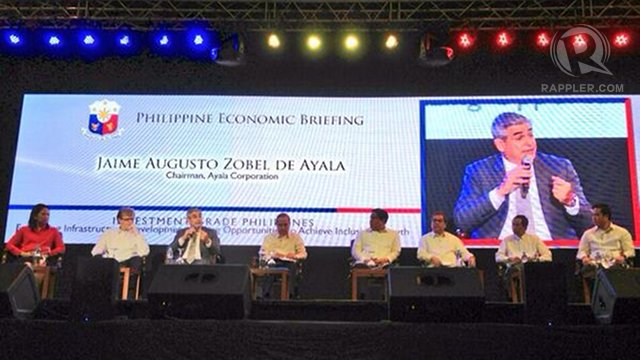SUMMARY
This is AI generated summarization, which may have errors. For context, always refer to the full article.

MANILA, Philippines – The chairman of the country’s oldest conglomerates urged government officials and businessmen to be “bolder” in undertaking reforms and pursuing long-term and capital-intensive projects that help reduce poverty.
At the Philippine economic forum on September 17, Ayala Corporation chairman Jaime Zobel de Ayala stressed that the macroeconomic and fiscal environment that the Aquino administration was able to provide businesses now is “extraordinary.”
“Interest rates are at their lowest level in a long time. That has allowed private sector institutions to grow capital…and be much more productive. The investment environment is better than ever before…The framework for us to work from a business perspective is an extraordinary one,” he told an audience of over 1,200 in Pasay City.
LIVE BLOG: Philippine economic briefing 2013
He urged both public and private sectors to take advantage of this position since the country’s current track of development opens the Philippines to “tremendous opportunities.” Taking advantage of these entail not only thinking out of the box but thinking big.
“The only point that I want to make is that all of us, both government and the private sector, have to be a lot bolder now,” he stressed.
“I sometimes get the feeling that we still consider ourselves a poor country. I don’t think so. I think we’re a wealthy country with tremendous opportunity and it needs a mental attitude that is aggressive, that is bigger in its way of thinking,” Zobel said.
READ: Philippines on poverty reduction: be patient
Capital intensive projects
The Ayala group is bidding for several big-ticket infrastructure projects of the government and is poised to beef up its energy portfolio. Both are capital intensive and involves large sums of investments.
The conglomerate has announced it has allocated a budget of up US$600 million to $700 million for power projects and about $300 million to $400 million for infrastructure projects up to 2016.
For infrastructure, it has joined the bidding for the P60 billion LRT-1 Cavite Extension rail project, which was recently declared a failure. Ayala group backed out citing the issues in the project’s contract terms that may make their investment too risky.
The group is also among the 7 consortiums that have been prequalified for the P17 billion Mactan-Cebu Airport expansion project. Just like the LRT-1 project, the expansion of the country’s 2nd busiest airport has also been delayed.
They are also eyeing the MRT-3 rail project, which the government is trying to restructure so it could auction the project off.
Energy and power generation is another sector they are eyeing. AC Energy Holdings Inc, Ayala Corporation’s power arm, has been seeking greenfield projects and has been eyeing to bid for the contracted capacities and/or assets of the government. They have stakes in coal and wind projects, among others.
The Ayala group is also involved in water services. Manila Water Co. Inc, the east zone concessionaire, is mulling suing the government for breach of contract. The Metropolitan Waterworks and Sewerage System (MWSS) recently decided to cut water rates, which Manila Water and Maynilad, the west zone concessionaire, are contesting.
Contracts
Ayala stressed that in designing projects that it wants the private sector to invest in, “the government has to take into account the positive externalities of projects. Let’s look beyond the returns.”
“Longevity of infrastructure projects is important,” he stressed.
Macquarie group head Michael Rodriguez echoed these while highlighted that the government is on the right track, at least conceptually, on making public-private partnership (PPP) scheme the main strategy for infrastructure projects.
“This has been the first government in a long time to focus on infrastructure. PPP is not a fad. This is about capability building. At the end you will also have bureaucrats learning from this process. PPP is a powerful procurement tool and it also pushes reforms.”
It is in the implementation of these projects that he voiced a concern. Echoing what is often the investors’ concerns about doing business with the government, he said: “We have to make sure that what was agreed upon today should be continued in the long-term.” – Rappler.com
Add a comment
How does this make you feel?
There are no comments yet. Add your comment to start the conversation.